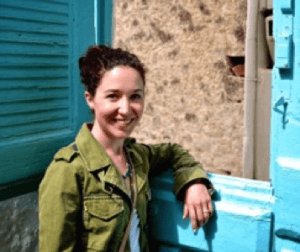by S. Thomasin Barsotti

Blair Robertson was working full-time at Groupon in Chicago when she was tested by Johnson O’Connor. That was 2012, and her position for the discount giant was as a City Planner for the national sales team. It was a job that involved a lot of research, strategic thinking, communication, and coordination. The job used many of her skills and talents, but she wasn’t passionate about it. When I ask her if she was dissatisfied by that job, she responds, “I wasn’t dissatisfied, I liked it fine. It was a creative environment, but I was getting bored, wasn’t moving forward.” At the same time, she was feeling frustrated by the part of her life that had usually brought her more happiness: her theatrical career. “I had dropped my Equity card a couple months before taking these tests,” she says (Actor’s Equity Association is the national labor union representing professional theatre actors and stage managers). “I was in this phase of thinking ‘I still want to be an actor, but how happy does it make me?’”
Only somewhat satisfied by her regular job and suddenly feeling confused by her acting career, Blair was in a place that many of Johnson O’Connor’s clients find themselves. She wanted to learn what might be missing.
A Subjective personality with high scores in Ideaphoria, Inductive Reasoning, and Foresight, Blair’s aptitude pattern suggests functioning as a specialized creative problem-solver. While involved with a Chicago theatre company, Blair took an interest in the casting process and served as the company’s Casting Director for several years. “I always thought I was good at it. I’m good at recognizing people’s strengths and I like to celebrate those strengths.” She endearingly compares the casting process to setting people up on a date, but adds that there was something else about it that brought her a lot of pleasure: it was all about bringing people together. “I’ve always greatly enjoyed connecting people, no matter what for.” In terms of her aptitudes, Blair found that casting provided more outlets for her core pattern, but didn’t want to give up acting altogether. She still does casting occasionally, but explains that she had to step back from that role because other industry professionals were starting to see her more as a producer and less as a performer, a transition she wasn’t ready for.
Acting is a strong outlet for auditory aptitudes (which Blair has), but in most situations does not satisfy the problem-solver in her. She discovered that even when she got cast in an ideal situation (she loved the play, loved the role, loved the company, etc.), she would still get restless. She says as an actor, “You aren’t fulfilling your vision, you’re fulfilling somebody else’s vision, and yes, you have a big say in the character development, but it’s your job to do what other people are telling you to do.”
Her summarizer at Johnson O’Connor encouraged her to ask herself what might change in her life if she sought a different role in theatre professionally, and thought of acting as something to do for fun. As a result, Blair is now considering a move toward producing, a shift which may give her more of a large scale creative problem-solving function in the industry than acting does. “I’m still coming to terms with that,” she says, smiling. Behind the smile, though, it’s clear there’s still some hesitation.
Blair believes her Subjective personality has a lot to do with these feelings of unrest as well. She was experiencing (and still is, though to a lesser extent than three years ago) something that many Subjective scorers encounter; she had a deep interest in a particular area, she was passionate about it and knew that’s where she wanted to spend her professional life. However, she was also feeling stressed by the notion that the ideal role for her in the theatre may not be the thing that drew her to the theatre in the first place: being on stage. “But then I think about times when I’ve been in a rehearsal room [as an actor], and I’ve watched a director doing something that I wouldn’t do,” she says, “I’ll have this really strong vision of what I’m seeing the play looking like. And obviously, as an actor, unless it’s a room where everyone is sharing their opinions, you need to be quiet. So I would go home and it would eat me up inside, but my fellow actors would ask, ‘Why do you care?’”
Blair asked her Johnson O’Connor summarizer if her Subjective personality means she’ll never be happy working with other people, a common concern for Subjective scorers who are more extroverted. She was relieved by the answer. “It’s not that I can’t work with other people. I just need to feel connected to what I’m doing.” It is true that Subjective scorers typically want to work with people who they’ve recruited themselves, clients who have sought them out for their expertise, or partners who share their vision; this is one reason why the Foundation often recommends that Subjective scorers consider consulting or running a small business. Also, she now accepts that her Subjective personality means that in order to be satisfied, she needs to be very specific about her path. In her words: “Right now, I’m in a holding pattern of not fully jumping in while I figure out what’s that thing. That one thing.”
She recounts her experience taking the tests, and years later still has a very clear memory of many of the worksamples. “I remember leaving and having a lot to think about,” she recalls, “I was really intrigued by the variety of tests and the different facets of thinking [that were being tested].” Blair says that there was no individual test result that was surprising to her, but that seeing them in combination was enlightening. Thinking about her natural strengths, even in the context of her everyday interactions, was informative and validating. “In some cases, what I had considered a personality trait is really just how my brain works. It’s not some social construct, it’s how my brain moves. It’s just cool to know that.”
Blair has found enjoyment recently working for a consulting firm that leverages acting methods to improve communication skills in a corporate environment. She works with clients to set up curricula and coordinate other logistical needs. For her, it’s a step up from her job at Groupon, but ultimately feels she’s still looking for the right fit in the long run. “I love some parts of [my current job], I believe in what the company does, and I really like my co-workers when I see them (Blair works from home). So, I say to myself, ‘The potential for growth here is big, and it can give you the flexibility to figure out what’s really going to make you happy.’”
What’s that going to be? That’s all part of the ride for Blair; her high Foresight kicks in, and she sees many possibilities for her future, from running her own theatre company to producing a television show. “And I still think about certain plays. I think ‘I would love to be in that show.’ I don’t feel like people have seen exactly what I can do yet.”
















